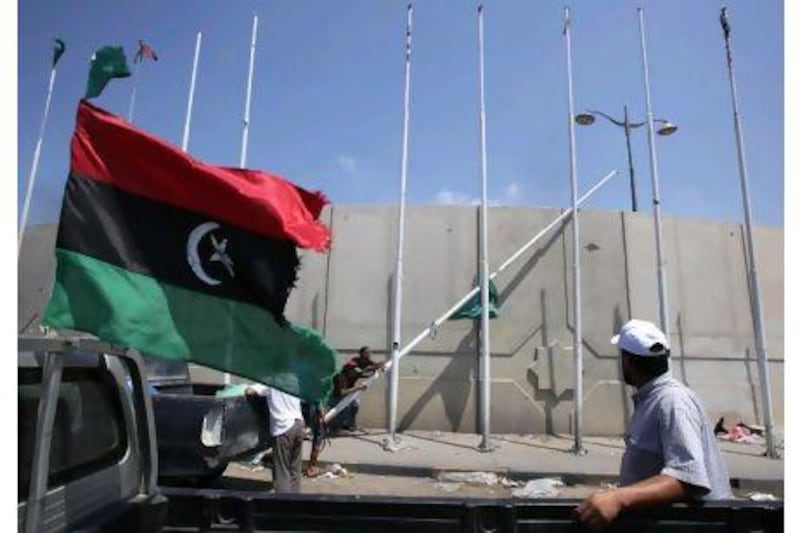TRIPOLI // Gunfire decreased yesterday in the Libyan capital as fighting shifted further afield, leaving rebel forces in Tripoli with a new challenge: fixing a broken city.
Picture gallery: Libya's NTC requests release of assets
The National Transitional Council requests that the world unfreeze the country's assets to pay for essential supplies even as the rebels battle Qaddafi's forces.
Last weekend rebel fighters made lightening advances into Tripoli, the object of six months of gruelling war to topple the regime of Colonel Muammar Qaddafi.
In recent days those advances have pushed to Col Qaddafi's doorstep, with rebel fighters battling their way into Bab Al Aziziya, his military compound near central Tripoli.
Yesterday rebels clashed with Col Qaddafi's forces in Ras Ajdir, on the Tunisian border, while Nato air strikes pounded his hometown of Sirte.
The military alliance said 29 vehicles mounted with weapons were hit near Sirte, a city of 150,000 about 400 kilometres east of the Tripoli. Rebels were trying to advance towards Sirte but expected fierce resistance from tribesmen and townspeople loyal to Col Qaddafi.
With loyalist forces dwindling and the colonel driven into hiding, rebel leaders have started to focus increasingly on restoring order to Libya's battered capital.
On Thursday, Mahmoud Jibril, head of the rebel National Transitional Council (NTC), warned of instability if public services were not restored and asked western governments for cash.
In Tripoli the green flags of Col Qaddafi have been supplanted by the rebel banner and revolutionary graffiti. Checkpoints of sand, furniture, parked cars and even sections of palm trunk have sprouted everywhere, staffed by young men with assault rifles.
However, food, water and petrol remain scarce, phone networks flicker on and off, and the city remains subject to cuts in electricity.
Rebel forces that have spent the past week trading fire with Col Qaddafi's militiamen were working to tighten security and - in some cases - enjoying a pause of sorts.
"It's Friday, and for Libyans Fridays have always been a day off," said Siddig Hossein Moatha, 40, a mechanic and rebel fighter who rolled into Tripoli last Sunday with fellow fighters from Misurata.
Yesterday, Mr Moatha and dozens of fighters were strolling about a walled patch of beachfront east of central Tripoli once used by Col Qaddafi for relaxing getaways.
Today the spot has become a staging point for some 3,000 Misurata fighters, Mr Moatha said, with some present and others deployed elsewhere.
Rebel mechanics were repairing vehicles by the gate, a young man was cleaning belts of machine-gun bullets, and several were swimming near a beachside patio. Many dozed under their gun-mounted pickups.
"We don't have any military operations today," Mr Moatha said. "But we've been sending groups in and out of Abu Salim this week."
Fighting in Tripoli has focused on the Abu Salim neighbourhood, the site of a prison that housed many opponents of Col Qaddafi's regime and where pro-Qaddafi forces dug in earlier this week.
Rebel fighters have sought to dislodge pro-Qaddafi forces while bringing aid to civilians trapped by the fighting, Mr Moatha said.
"The militias have heavy machine-guns, so people can't move," he said. "We put supplies in the street, then withdraw. Eventually the machine-gun is moved as well, so people can come out and get the supplies."
Meanwhile, Mr Moatha and his comrades were struggling with shaky communications systems to pass information up to the NTC, and were working to build relations with the local neighbourhood council.
While many in Tripoli profess solidarity with fighters from elsewhere, the potential for friction remains.
At one checkpoint in central Tripoli, a gruff demand for keys to check the boot frustrated the taxi-driver Wael.
"The rebels from Tripoli know us, they're polite. Those from outside, not always," said his sister Amal, 30, a hospital cook, riding beside him. "The rebels? All I want are freedom and security."
Back at the Misurata forces staging point, locals were gathering before a red-gold tent for Friday prayer and a sermon on the merits of tolerance by Sheikh Abdelraouf Gandour, freed two days earlier by rebel forces from Abu Salim prison.
Mr Gandour's voice floated over the assembled hundreds and, beyond them, rebel checkpoints with anti-aircraft guns. He counselled forgiveness and trust in the NTC.
Afterward Mr Gandour quit the podium as the crowd erupted in chants: "Oh God, oh God, God willing we will be victorious!"
Mr Gandour, meanwhile, took a reflective note.
"Muammar Qaddafi, who tried to divide Libyans, predicted conflict and civil war. I say we will be brothers who love one another in God, inshallah," he said. "First it is necessary that people's spirits calm."
* With additional reporting by Associated Press





